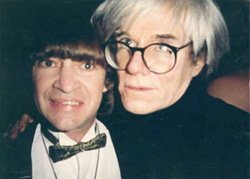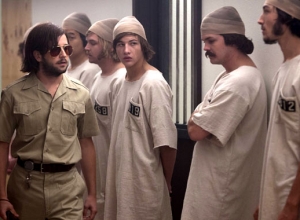The Stanford Prison Experiment Review
Based on real events, this sharply well-made film shifts from a rather light-hearted comedy into a horrific thriller. And it feels unnervingly natural as it does so. Where this goes is a bit relentless in its exploration of the darkest aspects of human capabilities, but it's also bracingly truthful. At the same time, it shows the enduring value of an experiment that seemed to go perilously wrong.

In Northern California in 1971, a group of 24 university students respond to a newspaper advert asking for participants in a psychological experiment. On the toss of a coin, organiser Dr Zimbardo (Billy Crudup) divides the young men into guards and inmates, and places them in a makeshift prison where they can be observed. And things start to turn nasty very quickly, as guard Christopher (Michael Angarano) targets snarky prisoner 8612 (Ezra Miller) for extra punishment. The guards also turn on the especially vulnerable 819 (Tye Sheridan). And when the inmates revolt, Zimbardo allows the guards to carry on with their increasingly harsh discipline. But Zimbardo's girlfriend Christina (Olivia Thirlby), herself a psychologist, worries that the situation has gone too far.
It's intriguing, and perhaps obvious, that it had to be a woman who saw through a scenario that had become little more than an out-of-control expression of masculinity. Even more telling, Zimbardo and his team became part of the experiment themselves, as they allowed and were fascinated by the abuse heaped on the prisoners by play-acting guards who let the power go to their heads. Director Kyle Patrick Alvarez (C.O.G.) shoots this in an unusually stripped-down style that gives the film a documentary tone. This low key approach means that the pacing sometimes feels draggy, as the intensely internalised suspense cycles around and around again. But what this is revealing about human behaviour is invaluable, and seriously terrifying.
Continue reading: The Stanford Prison Experiment Review







![Luke De-Sciscio talks to us about having the courage to be yourself, forgiving that which is outside of one's control and following whims [EXCLUSIVE] Luke De-Sciscio talks to us about having the courage to be yourself, forgiving that which is outside of one's control and following whims [EXCLUSIVE]](https://images.contactmusic.com/images/home/homepage/luke-de-sciscio-abof-a.jpg)


